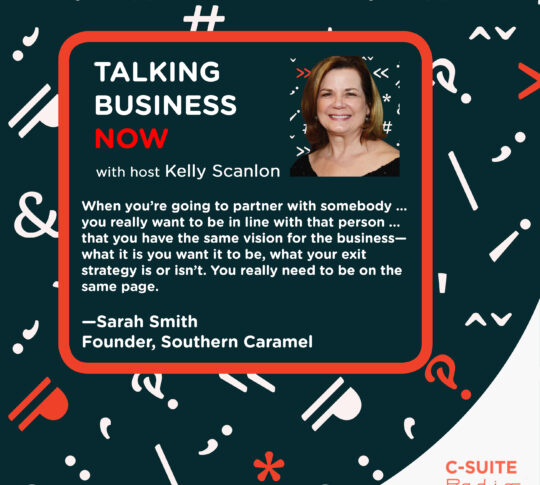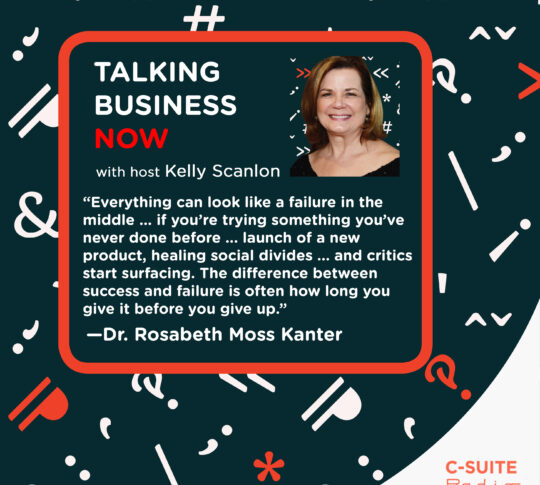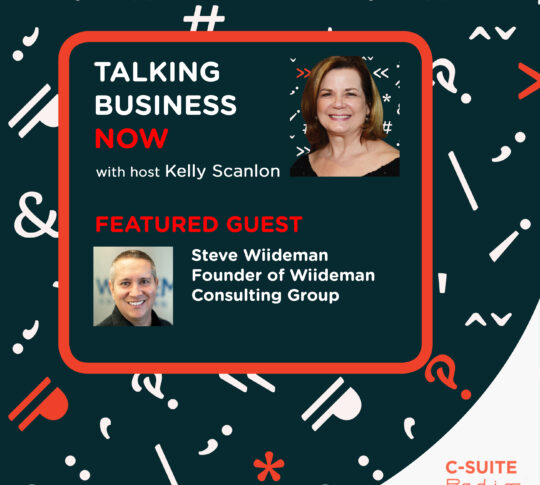Listen to the podcast episode here, or read the transcript below for “Do You Have What It Takes to Be an Entrepreneur?”
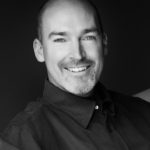
Kelly Scanlon: Welcome to Talking Business Now. I’m your host, Kelly Scanlon. Thank you for joining us.
We’re Talking Business Now with Gino Wickman, the founder of Entrepreneurial Leap and EOS Worldwide. At the age of 25, he took over the family business and seven years later, after turning it around, he successfully sold that company. An award-winning author and speaker, Gino now spends his time and energy helping prospective entrepreneurs get a huge leap on their entrepreneurial journeys. In this episode of Talking Business Now, Gino talks with us about his latest book, “Entrepreneurial Leap,” and how would-be entrepreneurs can realize their purpose and live the life they were born to live. Welcome to the show today, Gino.
Gino Wickman: Pleasure to be here.
Kelly Scanlon: You’ve been an entrepreneur since you were 21 years old, as I mentioned, a few years before you took over your family’s struggling business and turned it around. Tell us about your leap into entrepreneurship and what you did coming into a family business where there must have been lots of sacred cows, and how you as a young entrepreneur, were able to deal with that head on and get it turned around and successfully sell it.
Gino Wickman: You bet. Well, it’s interesting, because I would have never considered myself an entrepreneur in my 20s. I only discovered what I was at around 29. And looking back, you know, it was certainly all entrepreneurship. And so, I was this mislabeled derelict at 18 and lost, confused. And I was just this wild and crazy kid that had these traits considered the traits of an entrepreneur and so experimented with a lot of things, tried a bunch of different things, and then ultimately found my way into the family business that was in real estate sales training.
And one of the things I had done was I got into real estate investing. I ultimately got my real estate license and then ultimately ended up getting into real estate sales full blown, was very successful. And that’s when I fell in love with what it was that my dad did, which was training real estate agents.
Once I fell in love with the company, I set a goal for myself that I’m going to be the president of that company someday. And I did it by the age 25. I got involved in the business at 24, started at the bottom, worked my way up, ultimately took over a business that needed a turnaround, and I really felt I could save it. And so once again, just this wild and crazy kid with a lot of energy, but just a sponge for knowledge.
And then armed with two amazing mentors, Sam Cut my business mentor and my dad, who was my entrepreneur mentor, was able to turn that business around in three years, my dad and I partnered to do that, along with our third partner and then ultimately, after seven years, sold that business successfully, and then set off to pursue my next passion, which was then helping entrepreneurs.
It was right around age 29-30 that I realized what my real gift is and my talent and my purpose. And that’s helping entrepreneurs and so then I went off and built EOS Worldwide, which is an organization with 350 implementers all over the world that are helping 10s of thousands of entrepreneurs become successful. And I sold that business two years ago. And that brings us up to where we are today. That’s the fastest version I can give you.
Kelly Scanlon: There’s a lot packed into that story. So, let’s unbundle some of that. You talk about the difference between whether you’re born an entrepreneur or being an entrepreneur is something that’s nurtured. That’s an age-old question. I mean, people can debate that all day long, and you fall on the side of you’re born with it. So, what were the traits within you that you started to recognize? Because obviously, it was looking back that you realize them. When we did that self-revolution occur, and what were the traits that you finally realized that you possessed—that put you in a good position to be an entrepreneur, a successful one.
Gino Wickman: You bet. Well, I discovered the six essential traits over the last 12 years, once I started to shift my energy toward focusing on entrepreneurs in the making. And so very quickly, those six essential traits are:
- Visionary
- Passionate
- Problem-solver
- Driven
- Risk taker
- Responsible
And so, as I embarked on this new project—and there’s an old saying that says, “We teach what we need the most” by Daniel Kennedy—and so, when I was around 40 and as I was building EOS Worldwide, and it was relatively successful, I said, “When I turn 50, that’s where I’m spending my energy because I thought about my 18-year-old-self, who, like I said, was that lost, mislabeled derelict, confused and insecure. And if I had this information then, I would have had a 12-year jumpstart on where I ended up because I was just literally figuring it out every step of the way. And so, you know, finding my way into that business, you know, I didn’t call me myself an entrepreneur, I didn’t consider myself someone who could take the reins of a business, turn it around and grow it. I just ran into the fire and I just literally figured it out every single day.
So, there’s an easier and better way, or at least a clearer way to do it than what I did. And that is my intention is to help these entrepreneurs in the making, these people who are entrepreneurs and don’t even know it, and help them realize what they are much earlier—and just as quickly help the ones that aren’t but think they are realize that they may not be, because I’m trying to save them 10 years of hell.
Kelly Scanlon: Oh, yeah, a lot of money too. Time, money. Realizing that you’re not an entrepreneur is a good outcome.
Gino Wickman: Yes. And it’s not all it’s cracked up to be, you know. That’s the other message I like to send is, everybody thinks it’s this pinnacle that you arrive when you’re an entrepreneur. It’s just, it’s not all it’s cracked up to be. We’re a little bit crazy, and it’s nuts what we do, but I wouldn’t trade it for anything.
Kelly Scanlon: A lot of the listeners today are entrepreneurs already. Or they may be senior executives, managers who have been contemplating it. And so you talked about the six traits that are necessary and that if you recognize those earlier on, you can get a leg up on it, you can get a jumpstart on it or just decide not to do it. So, it wouldn’t hurt to go through those six. The first one you mentioned was Visionary—you have to be a visionary.
Gino Wickman: Yeah, I love it. I’m glad you asked that. Because it’s, you know, visionary doesn’t mean you have to be the next Thomas Edison, Steve Jobs or Walt Disney. So, you know, the bar is not that high. But what it does mean . . . and so, you know, as the listener is listening and you’re sitting here wondering if you have this trait of visionary . . . it just means you have ideas. It just means you have a lot of ideas. You’re able to connect the dots. You have this sixth sense, if you will. You kind of see things others don’t. You see around corners, and you just kind of put things together. So, you’re just always having ideas as you’re looking at how the world is working. And that’s what entrepreneurs chase.
Kelly Scanlon: They chase their idea. And I think you’ve said somewhere in your book that entrepreneurs don’t chase being an entrepreneur. Entrepreneurs chase their ideas and dreams. So that vision is what helps lead them there.
The next one that you talk about is Passion. And some people say that passion’s overrated, that passion will get you started. But that’s not really what you want. You need to be a good numbers person. You need to be able to strategically plan. And you hear about some of these serial entrepreneurs or entrepreneurs who, really when it comes down to it, they’re primarily investors. And you don’t need passion. You don’t need passion, just something that makes money. That’s what you need. You’ve got passion on your list though.
Gino Wickman: Yeah, for sure. And, you know, just as I will debate whether this is all nature over nurture, I will debate the importance of passion, you know. And I’ll explain it two ways. First of all, I believe passion is vital because it’s passion that gets you through the tough time. So, an entrepreneur that building something from the ground up, you cannot accomplish that feat without having passion for what you’re doing, because it’s borderline crazy.
And then number two, what I would suggest is, you know, passion doesn’t always mean it’s passion for the product. It’s passionate about the thing you’re trying to accomplish, the dent you’re trying to put in the universe, the organization you’re trying to build. There’s something you’re passionate about.
And then if I were to add one more thing to that, you know, some of the times the person you’re describing that knocks it, you know, they’re passionate about the money. And I’m not a big proponent of being passionate about the money because I don’t think that that’s the world’s greatest leader. But I would suggest that, you know, somebody who’s, you know, just invested in the business looking at the money side of it—and there are many people like that and they’re very successful—I would just consider them more a business owner and an investor than an entrepreneur because I’m talking about that entrepreneur that’s at the helm. And again, growing that business from the ground up.
Kelly Scanlon: And that leads us to the third one, which is Problem Solver.
Gino Wickman: So, I want to give you a little bit of a different angle on that and context on that. Because again, what we’re talking about are inherent traits. And so we’re not talking about skills; we’re not talking about something you can learn. And so, what we’re talking about is a person who is about to take an entrepreneurial leap and take a huge risk on bringing something to the world, whatever that is.
And so this trait, the way it shows up, if you have it, is you tend to lean into problems. In other words, you are a creative problem-solver. You love solving problems. It’s inherent in you. You’re not solving them because you have to, you’re solving them because you actually enjoy it. So, when there’s a setback, you’re the one that leads into a setback. You’re an optimist by nature. You’re seeing solutions when everyone else is seeing problems.
And so, you know, this is not something that can necessarily be taught. So, my point is we’re talking about the trait, one of six that this entrepreneur needs to have. So, reverse that and let’s pretend that this person has the other five traits, but not this one. They’re probably not going to succeed as an entrepreneur. And I would go as far as to say, they’re not going to succeed.
Now, let’s pretend they built a $5 million company and they’re surrounded by people and now they want to sell their business. And I’m speaking from experience here. I sold two businesses. In the second one that I sold, I put an amazing leadership team in place that still runs that company and grows at 40% every single year. Well, obviously, you want to bring people into that organization and around you that are problem solvers, that have this trait. They’re not necessarily entrepreneurs, but they have this trait. They’re people that love solving problems. They’re great creative problem solvers. Certainly, bring leaders into that organization that are problem solvers.
I’m compelled to share one other thing because the other reason I was able to sell the second business so well is because I replaced myself as the visionary entrepreneur at the helm. And so it took me five years. It was a five-year succession plan to replace myself with another visionary, replace my partner Don as integrator with another integrator and then have a rock-solid leadership team in place. So, it’s not like I just stepped away from the business and they figured it out. I worked putting in place in methodical succession plan so that those traits remained in place.
Kelly Scanlon: When you talk about someone who embraces problem solving, that they are there when there’s a fire. They’re running to it, as opposed to away from it. That goes hand in hand with your next characteristic or trait—and that is being Driven.
Gino Wickman: Mm hmm. Yeah. And so driven is actually a little bit different. Well, it’s different than the previous two. And what happens is passion and driven are two that sometimes get confused. The best way to explain it and understand it is passion is about the product, the service, the thing you want to bring to the world. And, so again, it’s about your entity. It’s about the problem you want to solve in the world. It’s about the product or service you want to bring.
Driven is about this thing that has nothing to do with that. It’s an internal fire that you’ve always had in you. This has been in you your whole life. It’s this sense of urgency that you have. It’s this competitive nature. It’s this desire to succeed. You’re self-motivated, you hustle, you absolutely love working hard. That cannot be taught. And hopefully that clarifies how those are completely different.
Kelly Scanlon: Yes, it does it clarify that. It’s also an important trait to have because so often, when you are that person at the top, you are isolated a lot of times, and so you have to rely on that inner drive to get you through.
One of the other ones that you mentioned—and it’s so funny because just about every single one of these can be up for debate and I’ve seen the debates on them—and that is Risk-taking. Some people equate the risk taking or being an entrepreneur is that you just, you know, you fly by the seat of your pants, you just, you know, you just make decisions off the cuff, and you’re not afraid of anything. And then others say that you take measured risks, that an entrepreneur is a risk taker, but they equip themselves to make those risky decisions in the best possible way. So, what’s your take on that?
Gino Wickman: Yeah, I love it. And so, you know, in the short answer, I’d say they take measured risks. But again, now let me explain this one and how it really shows up because you’re right, this one is always so misunderstood, because everybody thinks that, you know, risk taker and what makes you a risk taker is that you took an entrepreneurial leap and you started the business.
Well, the reality of it is, that is one of a thousand risks you’re about to take over the next few years. That is just one of them. So the risk taker part of it is the very difficult, very scary, very challenging decisions you’re making every single day that will potentially put you out of business. And so they’re calculated risk. But the point here is when it comes time to make that decision, you know, to fire your top-producing salesperson for an integrity issue, to fire your biggest customer and see 15% of your revenue go away because it’s going to hurt you in the long run. And I could keep going, you know, certainly these issues we’re facing now. But the point is, you don’t freeze when it comes time to make these decisions. You absolutely make the tough call.
A risk taker tends to be rebellious by nature. And so, again, as you’re listening out there, think about yourself. Do you tend to be more rebellious? In other words, are you willing to fail? No entrepreneur wants to fail, intends to fail. But they are willing to fail and pick themselves back up. And then a risk taker tends—the way they operate their life—is they tend to beg for forgiveness as opposed to ask for permission. And so this risk thing is an everyday thing. It’s not this one-time event, and that’s how it’s often misunderstood.
Kelly Scanlon: The last one of the six traits is Responsible. Talk to us about that.
Gino Wickman: Yeah. And so responsible to me, this is always the most fun because it’s often surprising for someone to see this on a list of six traits that defines a true entrepreneur. And so where this shows up is you blame no one when something goes wrong. You look in the mirror. You don’t look out at everyone else.
And what I’ve discovered is you could split the whole world up into two categories. There are people that when something goes wrong, they take responsibility. And there are people that blame everyone, and all of you listening out there, you could put everyone in your life into one of those two buckets. And why I’m convinced that this is nature over nurture—you’re born with this; it can’t be taught is—think about your brothers and sisters out there. I mean, you have families of four, where you have two kids that take no responsibility and two kids that take total responsibility raised in the same household by the same parents for the same 18 years. How on earth could they come out so different?
And so, simply put, this trait is you take responsibility. And someone shared something great with me, because a great explanation for responsibility is that if a meteor hits your building, you believe it’s your fault. That’s your default. If you get rear ended, it’s your fault. You chose that building, you built that building, you moved into that building. And so that’s how we responsible people react to problems and issues. Half the world responds that way and half the world blames everyone else and woe is me.
Kelly Scanlon: That’s a true characteristic of leadership as well because not all entrepreneurs are leaders, but that is a true characteristic of a leader.
Let’s talk a little bit about the book itself, the way it’s structured. “Entrepreneurial Leap” will take you through these six characteristics as well as several others. Once you have made the determination that you possess those characteristics, Gino goes into other aspects like the different things that you can do to increase your odds of success. And there are eight of those. And then there are several key things for building the business. I think, you know, there’s maybe 10 of those you’ve got in the book too, Gino?
Gino Wickman: Pretty close. Yeah.
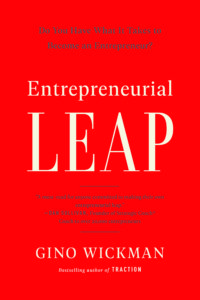
Kelly Scanlon: Yeah. So, there’s lots more in the book. We just did a very, very cursory overview there to give you an idea of what you can find in here. But the book itself, I like the way it’s set up. I don’t want to say easy read because I think that makes it sound like it’s been dumbed down. But it’s—it is easy to go through. It’s not an academic textbook on entrepreneurship. Talk to us about why you set it up this way and what readers will find.
Gino Wickman: Yeah, I love it. It’s definitely not academic. That’s the last thing on earth you’ll ever get from me, and so I don’t do theory and everything I do comes from the real world.
And so, in a nutshell, what you’re going to find is if you out there want to just kind of do a check up and get a sense of: Are you an entrepreneur in the making? Or are you a true entrepreneur? Or is there someone in your life that you think might be an entrepreneur in the making, you know, one of your kids, a family member, a spouse or significant other? And so, what this book does is it takes you or them on this emotional, psychological, philosophical soul-searching journey of self-discovery that is custom-designed for you, for an entrepreneur in the making.
And I offer a free assessment on the website at e-leap.com where you can go fill that out right now and actually get a result. And if you score 90 or higher, odds are pretty darn good that you’re an entrepreneur in the making. And then, once you’ve confirmed, it shows you a glimpse of the life, and then a path for how to get there and increase your odds of success.
Kelly Scanlon: There’s worksheets in here. There’s an assessment on the website, e-leap.com, that you can go out to. So very hands on. It’s a Very practical book.
Let’s say that one of our listeners, they’ve got this itch or they were in the midst of setting up a new business but hadn’t pulled the trigger to launch it or, you know, the launch date was supposed to be scheduled for two weeks into these shelter-at-home orders. What do you say to those folks? I mean, entrepreneurs are definitely used to dealing with uncertainty. That’s part of the risk taking you were talking about is dealing with that uncertainty every day when you get up. So, what do you say to those who are trying to actually launch their business during this period?
Gino Wickman: The first thing I want to say is, it’s times like these that spawn the new great entrepreneurs. And so, 08-09 spawned a ton of entrepreneurs. And so, these are the times. This is the excuse. If you just got laid off, if you’ve been itching to start something, you know, this is the time, regardless of whether you do that methodically. The reason it happens now is because, again, a bunch of people got laid off and people with these six essential traits, you know, the opportunity has just been put in front of them.
The next thing I would say, you know, for that person that was about to take the leap and just got their butt kicked because this all changed, well, you know, welcome to the club. But what’s interesting about this one is half the companies I talked to and work with are actually doing quite well. They’re on the right side of this thing. And then the other half are really getting their butts kicked. For most of the ones getting their bus butts kicked, they just gotta get back to the basics, you know, and my book “Traction” teaches about all the basics. And then some percentage of them have to totally reinvent themselves.
If you’re in a situation where you’ve got to reinvent yourself, or you were just about to take that leap and something changed, for most of you, still take the darn leap. Not a lot is going to change. These are the times you might find more customers because they’re in need. But the idea is to get as close to your customers and clients as possible. Just do nothing but help them. Make yourself absolutely irreplaceable right now. Make yourself incredibly valuable to them because it’s all the people that you help in these tough times that are going to help you when we come out of this. Relationships are formed more in these times than they are in good times. And, again, they will remember you better. And so that would be that point.
Then the last point I’ll share, my business mentor taught me, he taught this to me 30 years ago, almost 30 years ago, and it’s a 10-year business cycle. And the 10-year business cycle for every business is you will have two great years, six good years and two terrible years that will potentially put you out of business. And he told me that almost 30 years ago, and it is held true for 30 solid years now. 08-09 crushed a lot of companies, the dot com crash, and so we can go back 100 years and I can show you every one of those crises.
Again, we don’t know the crisis, a 911, a pandemic, or whatever. It’s going to be a great recession, a war. This happens. And the reality of it is, somebody with these six essential traits just leans into this. So, it’s so fascinating. I’m in two entrepreneur groups. And we’ll meet on Zoom now because that’s the way we’re all meeting. But the energy level is so incredibly high. The idea exchange is so incredible, because that’s all we’re doing is we’re talking to our clients, we’ve got our ear to the ground, and we’re thinking solutions. And then I will run with other groups. And I will just listen to them doom-and-gloom and suck their thumbs. You got a choice, you got a choice. You either lean into this or you curl up in a ball. And we choose to lean into it.
Kelly Scanlon: Yeah, I love that. I was interviewing an entrepreneur earlier this week, who said, hey, these are the times where you have to get in there and find your inner cowboy and then get on your horse and ride.
Gino Wickman: Hear! Hear! If you listen to me on the 10-year cycle, guess what? It’s coming again in the next 10 years. So, once you come out of this, it’s coming again, stop being surprised. And the other discipline is you’ve got to save six months’ cash reserves, both personally and for your business. And everyone that listened to me, they’re at peace right now. But the ones that don’t and had nothing, I mean, come on man, this is this is the real world.
Kelly Scanlon: Where can we get a copy of your book, Gino? Entrepreneurial Leap.
Gino Wickman: All major retailers, but the epicenter of all things Entrepreneurial Leap is the website e-leap.com. You will find nine free tools, there’s a free chapter of the book, that assessment we talked about. And so everything’s there. I would hope everyone goes there and at least fills out the assessment to find out if you’re a true entrepreneur in the making.
Kelly Scanlon: E-leap.com. Gino, thank you so much for being our guest on this episode of Talking Business Now. Appreciate all your insights.
Gino Wickman: Had a blast, Kelly. Thanks.
Kelly Scanlon: And I’m your host Kelly Scanlon. Thanks for joining us today. Be sure to visit the Talking Business Now website at TalkingBusinessNow.com for access to all my podcasts and to sign up for the weekly Talking Business Now newsletter.

